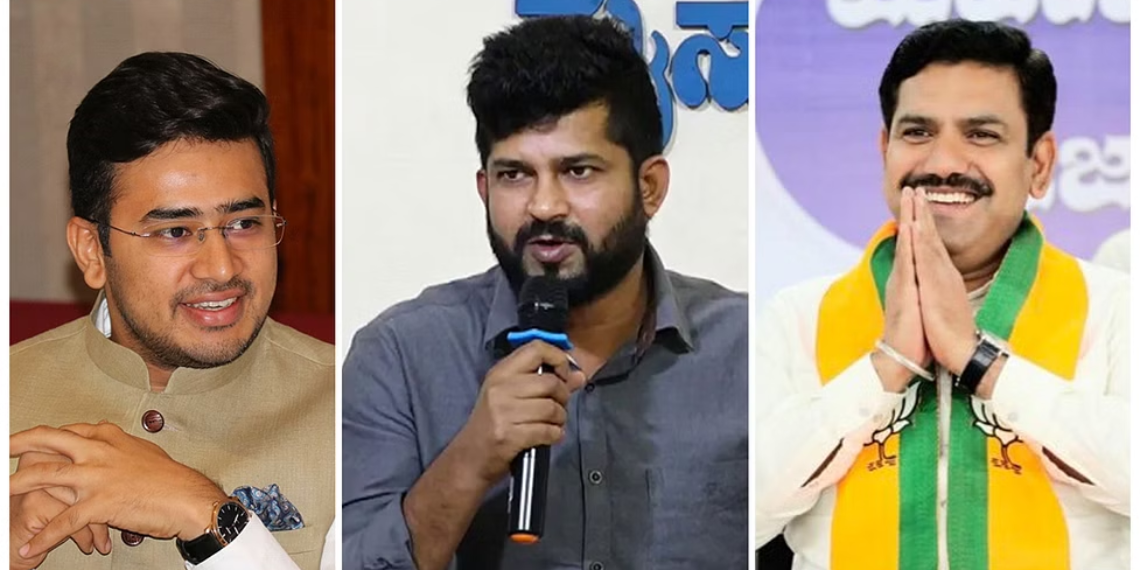New Delhi: In Karnataka, three Bharatiya Janata Party (BJP) parliamentarians — state BJP president Nalin Kumar Kateel from Dakshina Kannada, Pratap Simha from Mysore and Tejasvi Surya from Bengaluru South — are considered the Hindutva firebrands
During the campaign in Karnataka ahead of the assembly elections on 10 May, the three leaders were at the forefront when the BJP was working on a polarisation strategy, frequently targeting Tipu Sultan, raising issues like hijab and halal and scrapping 4 per cent reservation quota for Muslims in the state
As the BJP changed its strategy closer to the election and sought to underplay Hindutva and focus on caste-centric electoral politics, it even left out Simha and Surya from the list of the 40 star campaigners.
The BJP reverted to Hindutva towards the last leg of the campaign, but these Hindutva firebrands were kept largely confined to their respective Lok Sabha constituencies. The election results on Saturday put their electoral base to the test.
The constituencies of Kateel, Surya and Simha saw a dent in the party’s performance compared to 2018. In Kateel’s Lok Sabha constituency Dakshina Kannada, a BJP stronghold, the party won six out of eight assembly seats, one less than in the 2018 polls. In Surya’s (Bangalore South) and Simha’s (Mysore) constituencies, the party bagged four and one seat respectively out of a total eight in each.
Nalin Kateel
Nalin Kumar Kateel’s Dakshina Kannada has been a hotbed of Hindutva politics. The coastal district has elected Kateel thrice since 2009 to Lok Sabha.
In 2018, the party won seven of the eight assembly seats in this Lok Sabha constituency. It had then missed out only on the Mangalore seat, which has been with the Congress since 2008.
Kateel made headlines in January this year when he said that this election was not about “small issues” like road and sewage but about “love jihad”.
In a video from a public gathering in Mangalore, Nalin said, “So I am asking you, people, don’t speak about small issues like roads and sewage. If you’re worried about your children’s future, and if you want to stop love jihad, then we need the Bharatiya Janata Party. To eliminate love jihad, we need the Bharatiya Janata Party.”
Addressing another rally in February, the state BJP chief had said, “This time, the state assembly elections will not be fought between Congress and BJP, but between the ideologies of Savarkar and Tipu
Tejasvi Surya
In 32-year-old Tejasvi Surya’s Bangalore South Lok Sabha constituency, of the total eight assembly seats, four have gone to the BJP and four to the Congress. In 2018, the BJP had won five of the eight seats.
Ahead of the 10 May elections, Prime Minister Narendra Modi also did extensive campaigning in the country’s IT capital, which has been a BJP stronghold.
Surya, the Bharatiya Janata Yuva Morcha national president, had contested from former BJP minister Ananth Kumar’s Bangalore South seat in 2019 after the latter’s death. That was his first state election since he became an MP. Since then, Surya has been a star campaigner in various elections for the BJP.
Meanwhile, BJP’s L. A. Ravi Subramanya (Basavanagudi), Satish Reddy (Bommanahalli) and R. Ashoka (Padmanaba Nagar) — all of which fall in South Bangalore Lok Sabha consitutency — have held their seats since 2008 and won
Pratap Simha
In 46-year-old Pratap Simha’s Mysore in southern Karnataka, the BJP won only Krishnaraja out of eight assembly constituencies in his Lok Sabha seat. The party won four of them in the 2018 assembly elections.
The Vokkaliga-dominated Mysore region has been a stronghold of the Janata Dal (Secular) and the Congress, but the BJP was seeking to expand its footprint here.
In southern Karnataka, Pratap Simha’s constituency spreads across two districts of Mysore and Kodagu. The two BJP MLAs in Kodagu — Appachu Ranjan and K. G. Bopaiah — have won their seats in Madikeri and Virajpet since 2008, even before Simha became the MP







